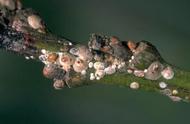Integrated Pest Management · Agriculture and Natural Resources
University of California
Scales
Scales do not resemble most other insects. Adult females of most species are circular to oval, wingless, and lack a separate head or other easily recognizable body parts.
Scales feed by sucking plant juices. When scales are abundant the feeding of some species can cause discoloration and distortion of leaves and shoots and plants may appear water stressed. Prolonged high populations of some species can cause dieback of terminals and reduced growth of plants.
Sticky honeydew is excreted by soft scales (family Coccidae) and certain other scales. Honeydew attracts ants, induces growth of blackish sooty mold, and fouls plants and surfaces beneath them.
Scale infestations can be annoying, innocuous, or severely damaging to plants. The importance of infestations depends on the abundance and species of scale, environmental factors, natural enemies, plant cultivar and species, and plant care practices.
Scales (overview)
En Español
Cochinillas (Scales)
Armored scales (family Diaspididae)
- Cycad scale, Furchadaspis zamiae
- Euonymus scale, Unaspis euonymi
- Greedy scale and latania scale, Hemiberlesia species
- Minute cypress scale, Carulaspis minima
- Oleander scale, Aspidiotus nerii
- Oystershell scale, Lepidosaphes ulmi
- San Jose scale, Diaspidiotus perniciosus
Soft scales (family Coccidae)
- Black scale, Saissetia oleae
- Brown soft scale, Coccus hesperidum
- Calico scale, Eulecanium cerasorum
- Citricola scale, Coccus pseudomagnoliarum
- Green shield scale, Pulvinaria psidii
- Irregular pine scale, Toumeyella pinicola
- Kuno scale, Eulecanium kunoense
- Lecanium scales, Parthenolecanium species
- Tuliptree scale, Toumeyella liriodendri
Other types of scales
- Cochineal scales, Ceroplastes species
- Cottony cushion scale, Icerya purchasi
- Ehrhorn’s oak scale, Mycetococcus ehrhorni
- European elm scale, Eriococcus spurius
- Incense cedar scale, or Monterey cypress scale, Xylococculus macrocarpae
- Kuwana oak scale, Kuwania quercus
- Oak pit scales, Asterodiaspis species
- Pit scales, Asterodiaspis, Asterolecanium, Bambusaspis, and Planchonia species
- Sycamore scale, Stomacoccus platani
- Wax scales, Ceroplastes species





